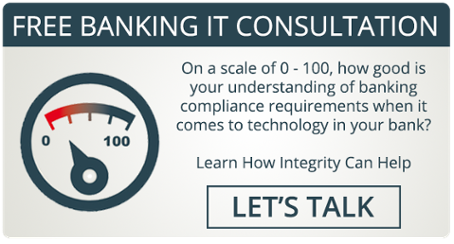6 Signs You Need Help with GLBA Compliance
Protect Private Data
Your financial institution must comply with the Gramm-Leach-Bliley Act.
The GLBA insists that these institutions share with consumers how they disclose information, and that private data is secured.
These organizations may need assistance with GLBA compliance.
In this article, we look at six signs that help a bank or loan service determine whether they should seek outside help in achieving compliance.
The first sign is that an institution is understaffed. The FTC recommends appointing one or more employees to coordinate an information security program. Chances are good that these individuals will also juggle more than just GLBA responsibilities. Finding an outside partner could make a huge difference.
Second, understanding and completing the FFEIC CAT can be difficult and time-consuming, and the CAT changes periodically. That's why it's important to work with a partner to help you on a regular basis.
For more information about GLBA compliance, continue reading this article.
Remember:
- The GLBA requires financial institutions to disclose information-sharing practices and to protect private data.
- Understaffed banks may not be able to meet GLBA compliance.
- Tricky government regulations may require expert interpretation and implementation.
-- Read More --
Every Bank Needs Support For Exams
The Cost Of Failure Is High
As cybercrime rises, banks must race to protect sensitive data.
Whether you're working with the FDIC, OCC, or the Federal Reserve, requirements for compliance are evolving.
Many small- to mid-size banks are unable to dedicate a full-time employee, much less a team, toward IT security.
That's where a third-party IT team can help.
The cost of failure is high.
Banks that do poorly on IT exams are forced to remediate the findings. Oversight then becomes more strict, and non-compliance results in added stress and anxiety. Money and reputation are on the line when it comes to compliance.
There are two more reasons behind why every bank needs support for cybersecurity exams. Take a look at our article to find out what they are.
Remember:
- IT exams vet financial institutions for how they handle sensitive data.
- Banks need help preparing for the exam and remediation following the exam, and partners can help banks in these areas.
- Scoring too low on these exams cost money and can damage your reputation.
-- Read More --
Why Cybersecurity Matters To Consumers
Protect Consumer Data
Banks contain sensitive Personally Identifiable Information (PII) about consumers. These institutions ask people to trust them with information about income, credit, and more.
Criminals know this, and they want to steal that information or money.
Security should matter to anyone who's employed by or does business with a bank.
One reason is because a data breach can harm a bank's reputation, causing consumers to lose trust and withdraw their money.
Banks must be proactive and communicate their security plans to consumers so that they know their information is valued and cared for. Anything less would yield low levels of trust.
We have four more reasons why cybersecurity for banks matters to consumers on our blog.
Remember:
- Consumers trust banks with valuable private information.
- Criminals want to exploit that information.
- Security breaches can cost banks their reputation.
-- Read More --
What’s Needed To Pass A Bank Exam
Tech Support Saves Time and Money
As finance and banking regulations increase every year, so does the amount of possible information that could be covered on a cybersecurity exam.
State and federal regulators hold banks accountable for keeping their customers' data secure.
That's why banks often turn to other companies for tech support. Expert firms know the ins and outs of exam specifics and compliance requirements.
However, if banks aren't able to hire a partner, banks still must understand the policies, procedures, and vulnerabilities that will be included.
Safety and soundness is a phrase that refers to a bank's overall financial state. Factors considered include merger decisions, payday lending, and credit card security. Consulting with an IT partner on these matters has been found to be valuable for banks.
The overall condition of a bank is not the only area in which an IT partner can help.
For more exam topics, head over to our blog to learn more.
Remember:
- Growing regulations can be hard for banks to keep up with.
- Third-party tech support can save time and money.
- A bank's overall financial state is just one consideration for a successful exam.
-- Read More --
How To Support IT For Banks
IT Support Has High Standards
The vital data that banks hold—names, addresses, account numbers, and so on—have made them a target for years.
To protect consumers, regulators have mandated that the banks adopt process and controls for data protection.
Supporting the IT for banks comes with its own set of unique challenges.
One challenge is experience.
Banking comes with its own software and digital infrastructure. Training staff for these tools can be an enormous time commitment and slow your business down. Banking software typically requires experienced technicians and strategists, as well as time-consuming and costly training.
That's why we recommend a bank partners with an IT team who understands banks. A hand-off to a partner builds confidence that the bank's data will be protected.
Two other areas face challenges in the IT support realm. To learn what they are, continue reading.
Remember:
- Banks are targets because of the data they possess.
- One challenge to IT support is that internal IT is overwhelmed or understaffed.
- IT partners should understand banks.







